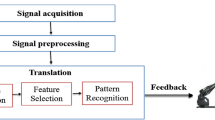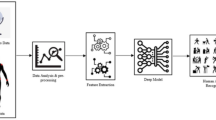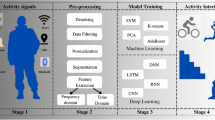Abstract
Building classification models in activity recognition is based on the concept of exchangeability. While splitting the dataset into training and test sets, we assume that the training set is exchangeable with the test set and expect good classification performance. However, this assumption is invalid due to subject variability of the training and test sets due to age differences. This happens when the classification models are trained with adult dataset and tested it with elderly dataset. This study investigates the effects of subject variability on activity recognition using inertial sensor. Two different datasets—one locally collected from 15 elders and another public from 30 adults with eight types of activities—were used to evaluate the assessment techniques using ten-fold cross-validation. Three sets of experiments have been conducted: experiments on the public dataset only, experiments on the local dataset only, and experiments on public (as training) and local (as test) datasets using machine learning and deep learning classifiers including single classifiers (Support Vector Machine, Decision Tree, K-Nearest Neighbors), ensemble classifiers (Adaboost, Random Forest, and XGBoost), and Convolutional Neural Network. The experimental results show that there is a significant performance drop in activity recognition on different subjects with different age groups. It demonstrates that on average the drop in recognition accuracy is 9.75 and 12% for machine learning and deep learning models respectively. This confirms that subject variability concerning age is a valid problem that degrades the performance of activity recognition models.



Similar content being viewed by others
Availability of data and material
Not applicable.
Code Availability
Not applicable.
References
Akbari A, Jafari R (2020) Personalizing activity recognition models with quantifying different types of uncertainty using wearable sensors. IEEE Trans Biomed Eng. https://doi.org/10.1109/TBME.2019.2963816
Anguita D, Ghio A, Oneto L, Parra X, Reyes-Ortiz JL (2013) A public domain dataset for human activity recognition using smartphones. In: ESANN 2013 proceedings, 21st European symposium on artificial neural networks, computational intelligence and machine learning (April), pp 437–442
Attal F, Mohammed S, Dedabrishvili M, Chamroukhi F, Oukhellou L, Amirat Y (2015) Physical human activity recognition using wearable sensors. Sensors (Switzerland) 15(12):31314–31338. https://doi.org/10.3390/s151229858
Banos O, Garcia R, Holgado-terriza JA, Damas M (2014) mHealthDroid: a novel framework for agile development of mobile health applications. Springer, Cham
Campbell AT, Lane ND, Miluzzo E, Peterson RA, Lu H, Zheng X, Musoles M, Fodor K, Ahn G-S, Eisenman SB (2008) The rise of people-centric sensing. IEEE Internet Comput 12(4):12–21
Chang AY, Skirbekk VF, Tyrovolas S, Kassebaum NJ, Dieleman JL (2019) Measuring population ageing: an analysis of the global burden of disease study 2017. Lancet Public Health 4(3):e159–e167. https://doi.org/10.1016/S2468-2667(19)30019-2
Chiang TC, Bruno B, Menicatti R, Recchiuto CT, Sgorbissa A (2019) Culture as a sensor? A novel perspective on human activity recognition. Int J Soc Robot. https://doi.org/10.1007/s12369-019-00590-3
Cornacchia M, Ozcan K, Zheng Y, Velipasalar S (2017) A survey on activity detection and classification using wearable sensors. IEEE Sens J 17(2):386–403. https://doi.org/10.1109/JSEN.2016.2628346
Dinarević EC, Husić JB, Baraković S (2019) Issues of human activity recognition in healthcare. In: 2019 18th International symposium INFOTEH-JAHORINA, INFOTEH 2019-proceedings (March), pp 20–22. https://doi.org/10.1109/INFOTEH.2019.8717749
Gani MO, Fayezeen T, Povinelli RJ, Smith RO, Arif M, Kattan AJ, Ahamed SI (2019) A light weight smartphone based human activity recognition system with high accuracy. J Netw Comput Appl 141:59–72. https://doi.org/10.1016/j.jnca.2019.05.001
Gil-Martín M, San-Segundo R, Fernández-Martínez F, Ferreiros-López J (2020) Improving physical activity recognition using a new deep learning architecture and post-processing techniques. Eng Appl Artif Intell 92:103679. https://doi.org/10.1016/j.engappai.2020.103679
Hammerla NY, Halloran S, Plötz T (2016) Deep, convolutional, and recurrent models for human activity recognition using wearables. In: IJCAI international joint conference on artificial intelligence 2016-Janua, pp 1533–1540
Howdon D, Rice N (2018) Health care expenditures, age, proximity to death and morbidity: implications for an ageing population. J Health Econ 57:60–74. https://doi.org/10.1016/j.jhealeco.2017.11.001
Hussain Z, Sheng M, Zhang WE (2019) Different approaches for human activity recognition: a survey. arXiv preprint arXiv 190605074, pp 1–28
Khatun S, Morshed BI (2018) Fully-automated human activity recognition with transition awareness from wearable sensor data for mHealth. In: IEEE international conference on electro information technology 2018-May, pp 934–938. https://doi.org/10.1109/EIT.2018.8500135
Khusainov R, Azzi D, Achumba IE, Bersch SD (2013) Real-time human ambulation, activity, and physiological monitoring: taxonomy of issues, techniques, applications, challenges and limitations. Sensors (Switzerland) 13(10):12852–12902. https://doi.org/10.3390/s131012852
Kim Y, Toomajian B (2016) Hand gesture recognition using micro-doppler signatures with convolutional neural network. IEEE Access 4:7125–7130. https://doi.org/10.1109/ACCESS.2016.2617282
Kwapisz JR, Weiss GM, Moore SA (2011) Activity recognition using cell phone accelerometers. ACM SIGKDD Explor Newsl 12(2):74. https://doi.org/10.1145/1964897.1964918
Labrador MA, Yejas ODL (2011) Human activity recognition using wearable sensors and smartphones. CRC, Cambridge
Lara ÓD, Labrador MA (2013) A survey on human activity recognition using wearable sensors. IEEE Commun Surv Tutor 15(3):1192–1209. https://doi.org/10.1109/SURV.2012.110112.00192
Lee G, Choi B, Jebelli H, Ahn CR, Lee SH (2020) Wearable biosensor and collective sensing-based approach for detecting older adults’ environmental barriers. J Comput Civ Eng 34(2):1–12. https://doi.org/10.1061/(ASCE)CP.1943-5487.0000879
Lv T, Wang X, Jin L, Xiao Y, Song M (2020) Margin-based deep learning networks for human activity recognition. Sensors (Switzerland). https://doi.org/10.3390/s20071871
Mannini A, Intille SS (2019) Classifier personalization for activity recognition using wrist accelerometers. IEEE J Biomed Health Inform 23(4):1585–1594. https://doi.org/10.1109/JBHI.2018.2869779
Mohammed Hashim BA, Amutha R (2020) Human activity recognition based on smartphone using fast feature dimensionality reduction technique. J Ambient Intell Humaniz Comput. https://doi.org/10.1007/s12652-020-02351-x
Nambu M, Nakajima K, Kawarada A, Tamura T (2000) The automatic health monitoring system for home health care. In: Proceedings of the IEEE/EMBS region 8 international conference on information technology applications in biomedicine, ITAB, pp 79–82. https://doi.org/10.1109/itab.2000.892353
Nweke HF, Teh YW, Al-garadi MA, Alo UR (2018) Deep learning algorithms for human activity recognition using mobile and wearable sensor networks: State of the art and research challenges. Expert Syst Appl 105:233–261. https://doi.org/10.1016/j.eswa.2018.03.056
Piyathilaka L, Kodagoda S (2015) Human activity recognition for domestic robots. Springer, Cham
Reiss A, Stricker D (2012) Introducing a new benchmarked dataset for activity monitoring. In: Proceedings - international symposium on wearable computers, ISWC (June 2012), pp 108–109. https://doi.org/10.1109/ISWC.2012.13
Reyes-Ortiz JL, Oneto L, Samà A, Parra X, Anguita D (2016) Transition-aware human activity recognition using smartphones. Neurocomputing 171:754–767. https://doi.org/10.1016/j.neucom.2015.07.085
Rezaie H, Ghassemian M (2018) Comparison analysis of Radio_Based and Sensor_Based wearable human activity recognition systems. Wirel Pers Commun 101(2):775–797. https://doi.org/10.1007/s11277-018-5715-4
Richter J, Wiede C, Dayangac E, Shahenshah A, Hirtz G (2017) Activity recognition for elderly care by evaluating proximity to objects and human skeleton data. In: Lecture notes in computer science (including subseries lecture notes in artificial intelligence and lecture notes in bioinformatics) 10163 LNCS, pp 139–155. https://doi.org/10.1007/978-3-319-53375-9_8
Roggen D, Calatroni A, Rossi M, Holleczek T, Förster K, Tröster G, Lukowicz P, Bannach D, Pirkl G, Ferscha A, Doppler J, Holzmann C, Kurz M, Holl G, Chavarriaga R, Sagha H, Bayati H, Creatura M, Del R. Millàn J (2010) Collecting complex activity datasets in highly rich networked sensor environments. In: INSS 2010–7th international conference on networked sensing systems, pp 233–240. https://doi.org/10.1109/INSS.2010.5573462
Sajjad Hossain HM, Roy N (2019) Active deep learning for activity recognition with context aware annotator selection. In: Proceedings of the ACM SIGKDD international conference on knowledge discovery and data mining, pp 1862–1870. https://doi.org/10.1145/3292500.3330688
Sakuma Y, Kleisarchaki S, Gurgen L, Nishi H (2019) Exploring variability in IoT data for human activity recognition. In: IECON Proceedings (industrial electronics conference) 2019-Octob, pp 5312–5318. https://doi.org/10.1109/IECON.2019.8927472
Satapathy SC, Das S (2016) PCA based optimal ANN classifiers for human activity recognition using mobile sensors data. Springer, Cham
Straczkiewicz M, Onnela J (2019) A systematic review of human activity recognition using smartphones. arXiv e-prints arXiv:1910.03970
Subasi A, Khateeb K, Brahimi T, Sarirete A (2020) Human activity recognition using machine learning methods in a smart healthcare environment. Elsevier Inc, Amsterdam
United Nations (2019) World population prospects 2019. Ten key findings. https://population.un.org/wpp/Publications/Files/WPP2019_10KeyFindings.pdf
Van Kasteren TLM, Englebienne G, Kröse BJA (2010) An activity monitoring system for elderly care using generative and discriminative models. Pers Ubiquit Comput 14(6):489–498. https://doi.org/10.1007/s00779-009-0277-9
Vepakomma P, De D, Das SK, Bhansali S (2015) A-Wristocracy: deep learning on wrist-worn sensing for recognition of user complex activities. In: 2015 IEEE 12th international conference on wearable and implantable body sensor networks, BSN 2015, pp 1–6. https://doi.org/10.1109/BSN.2015.7299406
Vijayaprabakaran K, Sathiyamurthy K, Ponniamma M (2020) Video-based human activity recognition for elderly using convolutional neural network. Int J Secur Priv Pervasive Comput. https://doi.org/10.4018/IJSPPC.2020010104
Xia K, Huang J, Wang H (2020) LSTM-CNN architecture for human activity recognition. IEEE Access 8:56855–56866. https://doi.org/10.1109/ACCESS.2020.2982225
Xu LI, He FX, Tian Z, Liu WEI (2020) Harmonic loss function for sensor-based human activity recognition based on LSTM recurrent neural networks. IEEE Access. https://doi.org/10.1109/ACCESS.2020.3003162
Yao L, Sheng QZ, Li X, Gu T, Tan M, Wang X, Wang S, Ruan W (2018) Compressive representation for device-free activity recognition with passive RFID signal strength. IEEE Trans Mob Comput 17(2):293–306. https://doi.org/10.1109/TMC.2017.2706282
Zahin A, Tan LT, Hu RQ (2019) Sensor-based human activity recognition for smart healthcare: a semi-supervised machine learning. Springer, Cham
Zhang H, Xiao Z, Wang J, Li F, Szczerbicki E (2020) A novel IoT-perceptive human activity recognition (HAR) approach using multihead convolutional attention. IEEE Internet Things J 7(2):1072–1080. https://doi.org/10.1109/JIOT.2019.2949715
Acknowledgements
This work was supported by the Universiti Sains Malaysia and Ministry of Higher Education Malaysia under Fundamental Research Grant Scheme (Grant No. 203.PKOMP.6711798).
Funding
This work was supported by the Universiti Sains Malaysia and Ministry of Higher Education Malaysia under Fundamental Research Grant Scheme (Grant No. 203.PKOMP.6711798).
Author information
Authors and Affiliations
Corresponding author
Ethics declarations
Conflict of interest
The authors declare that they have no conflicts of interest to report regarding the present study.
Ethics approval
Written informed consent was obtained prior to data collection in accordance with the approval by the human research ethics committee of Universiti Sains Malaysia (USM/JEPeM/18040205).
Consent to participate
Informed consent was obtained from all participants included in this study.
Consent for publication
We give our consent for our paper to be published in the Journal of Ambient Intelligence and Humanized Computing.
Additional information
Publisher’s Note
Springer Nature remains neutral with regard to jurisdictional claims in published maps and institutional affiliations.
Rights and permissions
About this article
Cite this article
Jimale, A., Mohd Noor, M. Subject variability in sensor-based activity recognition. J Ambient Intell Human Comput 14, 3261–3274 (2023). https://doi.org/10.1007/s12652-021-03465-6
Received:
Accepted:
Published:
Issue Date:
DOI: https://doi.org/10.1007/s12652-021-03465-6




